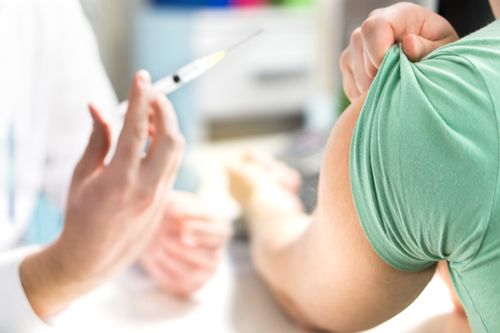Immunizations
Protect yourself with our Immunizations service at Villages Pharmacy. Safeguard your health with our reliable immunization solutions.

Protect Your Health with Convenient Pharmacy Immunizations
When it comes to disease prevention, immunizations are key. Getting vaccinated protects you and those around you. At Villages Pharmacy, our main focus is to help you and your loved ones stay up-to-date on the recommended vaccines. We offer a variety of immunizations. Our highly qualified staff can easily administer them here at the pharmacy. Speak to a staff member today about the immunizations we offer.
Flu Vaccines
Influenza, also known as the Flu, can be a potentially life threatening disease. During Flu season, occurring during the fall and winter months of the year, though the virus can spread year-round, affects millions of people every year. Thousands of people are hospitalized and tens of thousands die from flu-related causes. Complications can include: sinus infections, worsening of chronic conditions, missed work, and bacterial pneumonia.
The CDC recommends everyone 6 months of age and older should get a flu vaccine every season. It takes about two weeks after vaccination to protect against the infection therefore it is best to get vaccinated before spread has started in the community.
Pneumococcal vaccines
- The pneumococcal vaccine is designed to prevent pneumonia caused by Streptococcus pneumoniae bacteria. S. pneumoniae is a bacterium that lives naturally in the human nasopharynx, where it causes no harm. However, if the bacterium enters the bloodstream, it can cause serious infections including meningitis, septicemia, bacteremia, endocarditis, and otitis media. The pneumococcal vaccine helps protect children from these types of bacterial infections.
Tdap or TD vaccines - Tetanus Vaccine (Tdap)
1. What is Tdap?
The tetanus, diphtheria, pertussis (Tdap) vaccine is recommended for adults over 19 years old who have not received a previous dose of the vaccine. The vaccine contains antigens from three different strains of bacteria that cause these illnesses. These vaccines are given in two doses about 6 weeks apart.
2. How does Tdap work?
Tdap works by stimulating the immune system to produce antibodies that protect against tetanus, diphteria, and pertussis. Antibodies help fight off infections by attaching to the surface of harmful organisms and neutralizing them before they can do any damage.
3. When should I get my first dose?
You should get your first dose at least 4-6 weeks prior to traveling internationally. If you’re unsure if you need to get vaccinated, talk to your doctor. You may want to consider getting the second dose after returning home.
4. Where can I find out more information?
You can speak to a member of our staff to learn more!
5. Can I still get sick even though I got my Tdap shot?
Yes! Tetanus, diphthera, and pertussis (TDP) can affect anyone, including those who have been immunized. Symptoms of infection can appear anywhere from 2 days to 10 months after exposure. Symptoms include fever, headache, stiff neck, muscle aches, sore throat, runny nose, cough, and fatigue.
6. Is there anything else I need to know?
If you’ve had a reaction to a previous vaccination, tell your doctor right away. Also, make sure you don’t have any allergies to eggs, milk, or any of the ingredients in the vaccine.
A vaccine to prevent shingles
Shingles is a painful skin rash caused by the virus called varicella zoster (VZ). VZ is spread via direct contact with infected people or objects. It is not contagious once someone has recovered from the disease. Shingles occurs mainly in adults over 50 years old, but anyone who has had chicken pox before they reach adulthood may get shingles later in their lives. If you have never had chicken pox, you cannot get shingles. If you suspect you have shingles, call your doctor right away. You should go to the emergency room if you experience any of the following symptoms:
Pain that radiates down your back and/or side
A fever above 101 degrees Fahrenheit (38 degrees Celsius)
Blurred vision
Severe headache
Nausea or vomiting
Difficulty breathing
Moderna COVID-19 vaccine and booster
1. What is Covid-19?
Covid-19 is a respiratory disease caused by a novel coronavirus (SARS-CoV-2) first identified in Wuhan, China, in December 2019. The virus causes mild to severe symptoms including fever, cough, shortness of breath, pneumonia, and death.
2. How does Covid-19 spread?
The virus spreads primarily via droplets produced when an infected person sneezes or coughs. These droplets may land in the mouths or noses of people who are nearby or possibly get inhaled into the lungs. People then become infected if they breathe in these droplets.
3. Who gets sickened by Covid-19?
Anyone can get Covid-19. However, older adults and those with underlying medical conditions are at higher risk of developing serious illness.
4. How do we protect ourselves from getting sick?
Wash your hands frequently with soap and water for 20 seconds. If soap and water are not available, use hand sanitizer containing 60% alcohol. Avoid touching your eyes, nose, and mouth with unwashed hands. Cover your mouth and nose with a tissue when coughing or sneezing. Clean and disinfect surfaces often. Stay home if you feel ill.
5. Is there a vaccine?
Yes! Currently at the pharmacy, we administer the Moderna COVID-19 vaccine and booster shot.
